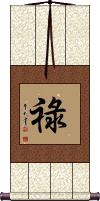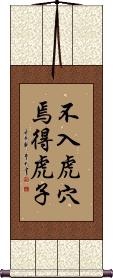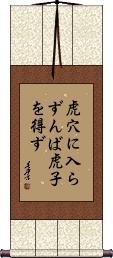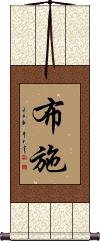Many custom options...
And formats...

Reward in Chinese / Japanese...
Buy a Reward calligraphy wall scroll here!
Personalize your custom “Reward” project by clicking the button next to your favorite “Reward” title below...
Heaven Blesses the Diligent
天道酬勤 can be interpreted in a few different ways:
God blesses those who work hard.
It is the way of Heaven to smile on the diligent.
God will reward those that are worthy.
Heaven blesses those who are diligent.
Whichever translation you like, a scroll like this on your wall may serve as a reminder to work hard because your diligence will pay off both in this life and the next.
Note: This can be pronounced in Korean, but it's not a commonly used term.
Prosperity
(also means salary)
祿 is occasionally used in China to mean prosperity or good fortune.
祿 once meant the “official's salary” in old feudal China and Korea (obviously, the officials lived well, so you can imagine how this was associated with the idea of being prosperous).
祿 is only used in Korean historical documents for “salary.” In old Japanese, this means fief, allowance, stipend, reward, pension, grant, and sometimes happiness depending on context. It's very obscure in modern Japanese.
We have other entries that are better suited for a prosperity wall scroll. This entry just addresses “the coffee cup issue” where this character has been used on coffee cups and tee-shirts. However, without context, the meaning is ambiguous to some.
How can you catch tiger cubs without entering the lair of the tiger?
Nothing ventured, nothing gained
While perhaps no longer politically correct, this Chinese proverb is a reminder that you must take risks if you want rewards.
不入虎穴焉得虎子 is similar to the English proverb, “Nothing ventured, nothing gained.”
The literal word order of the Chinese is, “If (you) don't enter the tiger's lair/cave, how can (you) get/obtain tiger cubs?.”
How can you catch tiger cubs without entering the lair of the tiger?
Nothing ventured, nothing gained
虎穴に入らずんば虎子を得ず is the Japanese version of an ancient Chinese proverb. 虎穴に入らずんば虎子を得ず is a reminder that you must take risks if you want the reward.
虎穴に入らずんば虎子を得ず is similar to the English proverb, “Nothing ventured, nothing gained.”
Note: Because this selection contains some special Japanese Hiragana characters, it should be written by a Japanese calligrapher.
Work Unselfishly for the Common Good
克己奉公 is a Chinese proverb that is often used to express how one should act as a government official. Most of us wish our public officials would hold themselves to higher standards. I wish I could send this scroll, along with the meaning to every member of Congress, and the President (or if I was from the UK, all the members of Parliament, and the PM)
This can also mean: “Place Strict Standards on Oneself in Public Service.”
The story behind this ancient Chinese idiom:
Cai Zun was born in China a little over 2000 years ago. In 24 AD, he joined an uprising led by Liu Xiu, who later became the emperor of the Eastern Han Dynasty.
Later, the new emperor put Cai Zun in charge of the military court. Cai Zun exercised his power in strict accordance with military law, regardless of the offender's rank or background. He even ordered the execution of one of the emperor's close servants after the servant committed a serious crime.
Cai Zun led a simple life but put great demands on himself to do all things honorably. The emperor rewarded him for his honest character and honorable nature by promoting him to the rank of General and granting him the title of Marquis.
Whenever Cai Zun would receive an award, he would give credit to his men and share the reward with them.
Cai Zun was always praised by historians who found many examples of his selfless acts that served the public interest.
Sometime long ago in history, people began to refer to Cai Zun as “ke ji feng gong.”
See Also: Unselfish | Selflessness | Altruism
Dana: Almsgiving and Generosity
布施 is the Buddhist practice of giving known as Dāna or दान from Pali and Sanskrit.
Depending on the context, this can be alms-giving, acts of charity, or offerings (usually money) to a priest for reading sutras or teachings.
Some will put Dāna in these two categories:
1. The pure or unsullied charity, which looks for no reward here but only in the hereafter.
2. The sullied almsgiving whose object is personal benefit.
The first kind is, of course, the kind that a liberated or enlightened person will pursue.
Others will put Dāna in these categories:
1. Worldly or material gifts.
2. Unworldly or spiritual gifts.
You can also separate Dāna into these three kinds:
1. 財布施 Goods such as money, food, or material items.
2. 法布施 Dharma, as an act to teach or bestow the Buddhist doctrine onto others.
3. 無畏布施 Courage, as an act of facing fear to save someone or when standing up for someone or standing up for righteousness.
The philosophies and categorization of Dāna will vary among various monks, temples, and sects of Buddhism.
Breaking down the characters separately:
布 (sometimes written 佈) means to spread out or announce, but also means cloth. In ancient times, cloth or robs were given to the Buddhist monks annually as a gift of alms - I need to do more research, but I believe there is a relationship here.
施 means to grant, to give, to bestow, to act, to carry out, and by itself can mean Dāna as a single character.
Dāna can also be expressed as 檀那 (pronounced “tán nà” in Mandarin and dan-na or だんな in Japanese). 檀那 is a transliteration of Dāna. However, it has colloquially come to mean some unsavory or unrelated things in Japanese. So, I think 布施 is better for calligraphy on your wall to remind you to practice Dāna daily (or whenever possible).
Not the results for reward that you were looking for?
Below are some entries from our dictionary that may match your reward search...
| Characters If shown, 2nd row is Simp. Chinese |
Pronunciation Romanization |
Simple Dictionary Definition |
礼 see styles |
rei / re れい |
More info & calligraphy: Respect |
祿 禄 see styles |
lù lu4 lu roku ろく |
More info & calligraphy: Prosperity(out-dated kanji) stipend; reward prosperity |
禄 see styles |
roku ろく |
More info & calligraphy: Prosperity |
布施 see styles |
bù shī bu4 shi1 pu shih fuse ふせ |
More info & calligraphy: Dana: Almsgiving and Generosity(n,vs,vi) (1) {Buddh} alms-giving; charity; (n,vs,vi) (2) {Buddh} offerings (usu. money) to a priest (for reading sutras, etc.); (surname) Fuho dāna 檀那; the sixth pāramitā, almsgiving, i. e. of goods, or the doctrine, with resultant benefits now and also hereafter in the forms of reincarnation, as neglect or refusal will produce the opposite consequences. The 二種布施 two kinds of dāna are the pure, or unsullied charity, which looks for no reward here but only hereafter; and the sullied almsgiving whose object is personal benefit. The three kinds of dāna are goods, the doctrine, and courage, or fearlessness. The four kinds are pens to write the sutras, ink, the sutras themselves, and preaching. The five kinds are giving to those who have come from a distance, those who are going to a distance, the sick, the hungry, those wise in the doctrine. The seven kinds are giving to visitors, travellers, the sick, their nurses, monasteries, endowments for the sustenance of monks or nuns, and clothing and food according to season. The eight kinds are giving to those who come for aid, giving for fear (of evil), return for kindness received, anticipating gifts in return, continuing the parental example of giving, giving in hope of rebirth in a particular heaven, in hope of an honoured name, for the adornment of the heart and life. 倶舍論 18. |
勞 劳 see styles |
láo lao2 lao rō |
to toil; labor; laborer; to put sb to trouble (of doing something); meritorious deed; to console (Taiwan pr. [lao4] for this sense) Toil, labour, trouble; to reward. |
報 报 see styles |
bào bao4 pao hou / ho ほう |
to announce; to inform; report; newspaper; recompense; revenge; CL:份[fen4],張|张[zhang1] (n,n-suf) (1) information; news; report; (2) (obsolete) reward; retribution; (given name) Mitsugi Recompense, retribution, reward, punishment, tell. |
幣 币 see styles |
bì bi4 pi mai まい |
money; coins; currency; silk (archaism) reward; present; gift; offering to the gods; (personal name) Minematsu |
庚 see styles |
gēng geng1 keng kanoe; kou / kanoe; ko かのえ; こう |
age; seventh of the ten Heavenly Stems 十天干[shi2 tian1 gan1]; seventh in order; letter "G" or Roman "VII" in list "A, B, C", or "I, II, III" etc; ancient Chinese compass point: 255°; hepta 7th in rank; seventh sign of the Chinese calendar; (surname, given name) Kō Age; change; west; to reward; the seventh of the ten celestial stems. |
果 see styles |
guǒ guo3 kuo ka か |
fruit; result; resolute; indeed; if really (1) {Buddh} (See 因・2) phala (attained state, result); (2) {Buddh} (See 悟り・2) enlightenment (as the fruits of one's Buddhist practice); (3) (See 果物) fruit; (counter) (4) counter for pieces of fruit; (male given name) Minoru phala, 頗羅 fruit; offspring; result, consequence, effect; reward, retribution; it contrasts with cause, i. e. 因果 cause and effect. The effect by causing a further effect becomes also a cause. |
犒 see styles |
kào kao4 k`ao kao |
to reward or comfort with presents of food, drink etc |
貤 see styles |
yí yi2 i |
to promote; to reward |
賞 赏 see styles |
shǎng shang3 shang shou / sho しょう |
to bestow (a reward); to give (to an inferior); to hand down; a reward (bestowed by a superior); to appreciate (beauty) (n,n-suf) prize; award; (given name) Masaru to reward, award |
酬 see styles |
chóu chou2 ch`ou chou munekata むねかた |
to entertain; to repay; to return; to reward; to compensate; to reply; to answer (personal name) Munekata Pledge, toast, requite. |
鯠 see styles |
lái lai2 lai |
to confer; to bestow on an inferior; to reward |
お礼 see styles |
orei / ore おれい |
(1) (polite language) thanks; gratitude; (2) (polite language) manners; etiquette; (3) (polite language) bow; (4) (polite language) reward; gift; (5) (polite language) ceremony; ritual |
三堅 三坚 see styles |
sān jiān san1 jian1 san chien sanken |
The three sure or certain things are 身, 命 and 財, i.e. the reward of the true disciple is an infinite body or personality, an endless life, and boundless (spiritual) possessions, 無極之身, 無窮之命, 無盡之財, v. 能摩經:菩薩品. |
三生 see styles |
sān shēng san1 sheng1 san sheng mitsuo みつお |
(surname, given name) Mitsuo The three births, or reincarnations, past, present, future. Tiantai has (a) 種 planting the seed; (b) 熟 ripening; (c) 脫 liberating, stripping, or harvesting, i.e. beginning, development, and reward of bodhi, a process either gradual or instantaneous. Huayan has (a) 見聞生 a past life of seeing and hearing Buddha-truth; (b) 解行生 liberation in the present life; (c) 證入生 realization of life in Buddhahood. This is also called 三生成佛, Buddhahood in the course of three lives. There is also a definition of three rebirths as the shortest term for arhatship, sixty kalpas being the longest. There are other definitions. |
三身 see styles |
sān shēn san1 shen1 san shen sanjin; sanshin さんじん; さんしん |
{Buddh} trikaya (three bodies of the Buddha); (surname) Sanmi trikāya. 三寶身 The threefold body or nature of a Buddha, i.e. the 法, 報, and 化身, or dharmakāya, sambhogakāya, and nirmāṇakāya. The three are defined as 自性, 受用, and 變化, the Buddha-body per se, or in its essential nature; his body of bliss, which he "receives" for his own "use" and enjoyment; and his body of transformation, by which he can appear in any form; i.e. spiritual, or essential; glorified; revealed. While the doctrine of the trikāya is a Mahāyāna concept, it partly results from the Hīnayāna idealization of the earthly Buddha with his thirty-two signs, eighty physical marks, clairvoyance, clairaudience, holiness, purity, wisdom, pity, etc. Mahāyāna, however, proceeded to conceive of Buddha as the Universal, the All, with infinity of forms, yet above all our concepts of unity or diversity. To every Buddha Mahāyāna attributed a three-fold body: that of essential Buddha; that of joy or enjoyment of the fruits of his past saving labours; that of power to transform himself at will to any shape for omnipresent salvation of those who need him. The trinity finds different methods of expression, e.g. Vairocana is entitled 法身, the embodiment of the Law, shining everywhere, enlightening all; Locana is 報身; c.f. 三賓, the embodiment of purity and bliss; Śākyamuni is 化身 or Buddha revealed. In the esoteric sect they are 法 Vairocana, 報 Amitābha, and 化 Śākyamuni. The 三賓 are also 法 dharma, 報 saṅgha, 化 buddha. Nevertheless, the three are considered as a trinity, the three being essentially one, each in the other. (1) 法身 Dharmakāya in its earliest conception was that of the body of the dharma, or truth, as preached by Śākyamuni; later it became his mind or soul in contrast with his material body. In Mādhyamika, the dharmakāya was the only reality, i.e. the void, or the immateria1, the ground of all phenomena; in other words, the 眞如 the tathāgatagarbha, the bhūtatathatā. According to the Huayan (Kegon) School it is the 理or noumenon, while the other two are氣or phenomenal aspects. "For the Vijñānavāda... the body of the law as highest reality is the void intelligence, whose infection (saṃkleҫa) results in the process of birth and death, whilst its purification brings about Nirvāṇa, or its restoration to its primitive transparence" (Keith). The "body of the law is the true reality of everything". Nevertheless, in Mahāyāna every Buddha has his own 法身; e.g. in the dharmakāya aspect we have the designation Amitābha, who in his saṃbhogakāya aspect is styled Amitāyus. (2) 報身Sambhogakāya, a Buddha's reward body, or body of enjoyment of the merits he attained as a bodhisattva; in other words, a Buddha in glory in his heaven. This is the form of Buddha as an object of worship. It is defined in two aspects, (a) 自受用身 for his own bliss, and (b) 他受用身 for the sake of others, revealing himself in his glory to bodhisattvas, enlightening and inspiring them. By wisdom a Buddha's dharmakāya is attained, by bodhisattva-merits his saṃbhogakāya. Not only has every Buddha all the three bodies or aspects, but as all men are of the same essence, or nature, as Buddhas, they are therefore potential Buddhas and are in and of the trikāya. Moreover, trikāya is not divided, for a Buddha in his 化身 is still one with his 法身 and 報身, all three bodies being co-existent. (3) 化身; 應身; 應化身 nirmāṇakāya, a Buddha's transformation, or miraculous body, in which he appears at will and in any form outside his heaven, e.g. as Śākyamuni among men. |
二報 二报 see styles |
èr bào er4 bao4 erh pao nihō |
The dual reward. (1) 依報 or 依果 The material environment on which a person depends, resulting from former karma, e.g. country, house, property, etc. (2) 正報 or 正果 his direct reward, i. e. his body, or person. |
五乘 see styles |
wǔ shèng wu3 sheng4 wu sheng gojō |
The five vehicles conveying to the karma reward which differs according to the vehicle: they are generally summed up as (1) 入乘 rebirth among men conveyed by observing the five commandments; (2) 天乘 among the devas by the ten forms of good action; (3) 聲聞乘 among the śrāvakas by the four noble truths; (4) 緣覺乘 among pratyekabuddhas by the twelve nidānas; (5) 菩薩乘 among the Buddhas and bodhisattvas by the six pāramitās 六度 q. v. Another division is the various vehicles of bodhisattvas; pratyekabuddhas; śrāvakas; general; and devas-and-men. Another is Hīnayāna Buddha, pratyekabuddhas, śrāvakas, the gods of the Brahma heavens, and those of the desire-realm. Another is Hīnayāna ordinary disciples: śrāvakas: pratyekabuddhas; bodhisattvas; and the one all-inclusive vehicle. And a sixth, of Tiantai, is for men; devas; śrāvakas-cum-pratyekabuddhas; bodhisattvas: and the Buddha-vehicle. The esoteric cult has: men, corresponding with earth; devas, with water: śrāvakas, with fire: pratyekabuddhas, with wind; and bodhisattvas, with 空 the 'void'. |
佛土 see styles |
fó tǔ fo2 tu3 fo t`u fo tu butsudo |
buddhakṣetra. 佛國; 紇差怛羅; 差多羅; 刹怛利耶; 佛刹 The land or realm of a Buddha. The land of the Buddha's birth, India. A Buddha-realm in process of transformation, or transformed. A spiritual Buddha-realm. The Tiantai Sect evolved the idea of four spheres: (1) 同居之國土 Where common beings and saints dwell together, divided into (a) a realm where all beings are subject to transmigration and (b) the Pure Land. (2) 方便有餘土 or 變易土 The sphere where beings are still subject to higher forms of transmigration, the abode of Hīnayāna saints, i.e. srota-āpanna 須陀洹; sakṛdāgāmin 斯陀含; anāgāmin 阿那含; arhat 阿羅漢. (3) 實報無障礙 Final unlimited reward, the Bodhisattva realm. (4) 常寂光土 Where permanent tranquility and enlightenment reign, Buddha-parinirvāṇa. |
依報 依报 see styles |
yī bào yi1 bao4 i pao ehou / eho えほう |
{Buddh} (See 正報) circumstantial retribution; circumstances (e.g. geographical, societal) one is born into because of karma in previous lives v. 依正. |
優賞 see styles |
yuushou / yusho ゆうしょう |
(form) high praise; hearty applause; cordial commendation; special reward; grand prize |
八種 八种 see styles |
bā zhǒng ba1 zhong3 pa chung yagusa やぐさ |
(place-name) Yagusa (布) 施 Eight causes of giving―convenience; fear; gratitude; reward-seeking; traditional (or customary); hoping for heaven; name and fame; personal virtue. |
共報 共报 see styles |
gòng bào gong4 bao4 kung pao gūhō |
Collective retribution; reward or punishment of the community, or in common, for the 共業 deeds of the community, or even of the individual in their effects on the community. |
別報 别报 see styles |
bié bào bie2 bao4 pieh pao beppou / beppo べっぽう |
another report Differentiated rewards according to previous deeds, i.e. the differing conditions of people in this life resulting from their previous lives. |
功徳 see styles |
kudoku くどく |
(1) {Buddh} merit; virtuous deed; act of merit; act of charity; (2) {Buddh} divine reward (for virtuous deeds); grace (of the buddhas and gods); blessing; (3) {Christn} merit; meritum; (personal name) Kōtoku |
功德 see styles |
gōng dé gong1 de2 kung te kudoku |
achievements and virtue Virtue achieved; achievement; power to do meritorious works; merit; meritorious virtue; the reward of virtue; a name for 弗若多羅 Puṇyatara, one of the twenty-four 天尊 deva aryas, worshipped in China. |
労う see styles |
negirau ねぎらう |
(transitive verb) (kana only) to thank for; to reward for |
勝報 胜报 see styles |
shèng bào sheng4 bao4 sheng pao shōhō しょうほう |
news of a victory superior reward (for good karma) |
Click here for more reward results from our dictionary
The following table may be helpful for those studying Chinese or Japanese...
| Title | Characters | Romaji (Romanized Japanese) | Various forms of Romanized Chinese | |
| Heaven Blesses the Diligent | 天道酬勤 | tiān dào chóu qín tian1 dao4 chou2 qin2 tian dao chou qin tiandaochouqin | t`ien tao ch`ou ch`in tientaochouchin tien tao chou chin |
|
| Prosperity | 祿 禄 | fuchi | lù / lu4 / lu | |
| How can you catch tiger cubs without entering the lair of the tiger? | 不入虎穴焉得虎子 | bú rù hǔ xué yān dé hǔ zǐ bu2 ru4 hu3 xue2 yan1 de2 hu3 zi3 bu ru hu xue yan de hu zi buruhuxueyandehuzi | pu ju hu hsüeh yen te hu tzu pujuhuhsüehyentehutzu |
|
| How can you catch tiger cubs without entering the lair of the tiger? | 虎穴に入らずんば虎子を得ず | koketsu ni haira zun ba tora ko o e zu | ||
| Work Unselfishly for the Common Good | 克己奉公 | kè jǐ fèng gōng ke4 ji3 feng4 gong1 ke ji feng gong kejifenggong | k`o chi feng kung kochifengkung ko chi feng kung |
|
| Dana: Almsgiving and Generosity | 布施 | fuse | bù shī / bu4 shi1 / bu shi / bushi | pu shih / pushih |
| In some entries above you will see that characters have different versions above and below a line. In these cases, the characters above the line are Traditional Chinese, while the ones below are Simplified Chinese. | ||||
Successful Chinese Character and Japanese Kanji calligraphy searches within the last few hours...









